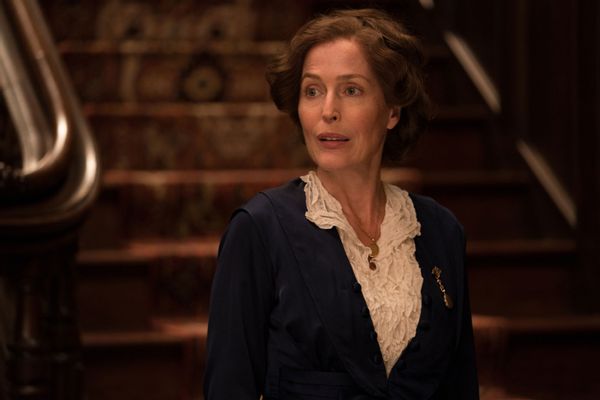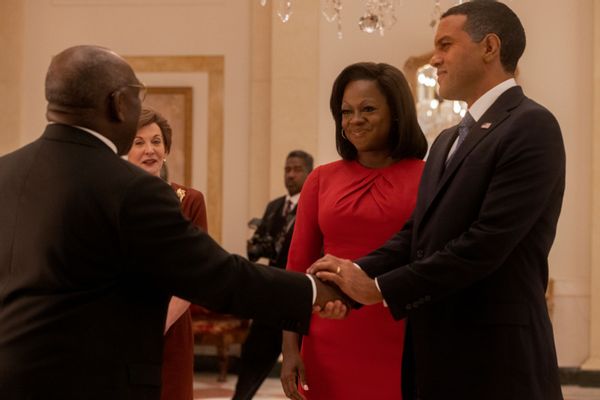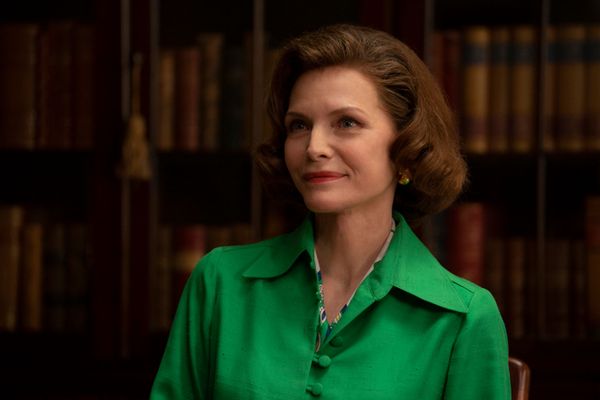
"The First Lady" opens by asking us to consider the broader meaning of portraiture. I doubt the writers intended that in depicting Eleanor Roosevelt (Gillian Anderson), Betty Ford (Michelle Pfeiffer) and Michelle Obama (Viola Davis) sitting for their official paintings, each in their era. Taken as they are, they're entryways into what should be revelatory examinations of their lives, told in a 10-episode pass.
Still, that short sequence invites us to consider what a sanctioned portrait, chosen and informed by the subject's wishes, tells us about the person sitting for it – which is, nothing that they don't want us to see. Regardless of what Michelle Obama's portraitist Amy Sherald (Tiffany Hobbs) intends when she states, "I am interested in the real," as she photographs her, it's impossible to fully render a genuine take on a person in two dimensions.
We've seen better examples of what "The First Lady" endeavors to do in "Mrs. America."
Television is a better medium for that, even when a series doesn't nail everything about someone's truth. "The First Lady" is an unauthorized biographical drama, clearly. I cannot imagine a couple as connected to the media world as the Obamas seeing it as the definitive telling of Michelle's story. Her Netflix documentary "Becoming," based on her memoir, continues to serve that purpose for the time being.
We've seen better examples of what "The First Lady" endeavors to do in "Mrs. America" and, yes, even this year's "Julia," regardless of the liberties taken in portraying private moments or other unknowable parts of their subjects' lives. Their colorful means of fictionalizing history's sea changes help us to better appreciate the people who made it.
RELATED: "Mrs. America" & the birth of trolling
Also consider how "The Crown" takes advantage of its subjects' reputational opacity to construct its own version of the life as a British royal, making Queen Elizabeth II and her family vulnerable souls worthy of empathy or scorn, or understanding in either case. Whether the real Windsors are truly like their Netflix counterparts matters less than whether we believe in their TV versions' humanity.
Each episode wastes the firepower in front of the camera.
"The First Lady" never achieves such roundedness, despite the passionate performances by its enormously talented leads. If you hoped Davis, Anderson and Pfeiffer would be free to plumb the complex interiority of these iconic presidential wives, this is very far from the case.
Instead, each episode wastes the firepower in front of the camera by plugging its actors into flashpoints and watershed moments as opposed to filling in the open canvas with cues and hints about who they are during the quieter moments. Seeing these women meeting history as the person life shaped them to be is more interesting than simply seeing how they react when insults and disasters land on their doorstep; we already know that part.
Yet for whatever reason showrunner Cathy Schulman and the writers think we want to see Davis recreate that time Michelle drove Fox News nuts by saying, "For the first time in my adult life, I am really proud of my country, because it feels like hope is making a comeback," without pondering the life experiences that may have informed that very honest, relatable statement.

Their stories just kind of . . . hang together.
We're introduced to Betty by watching Pfeiffer shake it to Harry Nilsson's "Coconut" as a way of foreshadowing her substance abuse problem early on. Eventually the Republican First Lady becomes a feminist working to pass the Equal Rights Amendment and a public face for breast cancer survivors. But she's introduced as the personification of a Very Special Episode subject.
Their stories just kind of . . . hang together rather than serving as points of ingress enabling access to the true personalities behind the women we see in archival footage, photos and film. And each actor following that unoriginal lead. Anderson regally embodies Eleanor Roosevelt's determination to champion human rights, the working class and her anti-racist efforts. We see much of her stubbornness and private sadness but little expression of Eleanor's joy aside from what she gleans from her relationship with journalist Lorena Hickok (Lily Rabe) written here as Eleanor's lover.
Private moments shared by Michelle and Barack Obama (O. T. Fagbenle) allow for more humanity, probably because we see them in being affectionate and loving as a couple on a regular basis. And yet, it's Malia (Lexi Underwood) who has to explain the importance of publicly supporting LGBTQIA rights to her father as if somehow the importance of him throwing his voice behind the cause was lost on him before that.

As a result, several of them are left floating somewhere between celebrity impersonation and interpretation – mainly Davis, Anderson and Fagbenle. Sutherland too, although his FDR impression never approaches the grating irritation of the others.
Playing a real person with signature mannerisms is a challenge regardless of who is tasked to carry it off.
Davis recently admitted to being terrified of what Michelle Obama would think about her performance, and the unfortunate effect of that nervousness cracks through in the way she contorts her lips to talk Michelle, or awkwardly clips her sentences.
Playing a real person with signature mannerisms is a challenge regardless of who is tasked to carry it off; it is so easy to overemphasize ways that someone speaks or purses their lips to the point of pushing a close study into parody. Davis' Michelle portrayal takes up a longterm lease in that transitional neighborhood, vacillating between genuine relatability and distractions.
Her impression isn't anywhere nearly as overpowering as Fagbenle's tightly tailored imitation of Barack Obama's quirky speech patterns, which is both dead on and over the top. Meanwhile the actors playing the younger versions of the Obamas, Jayme Lawson and Julian De Niro, largely forego impersonation. It doesn't take away from the scenes they share.
Lawson, in fact, beautifully captures the future first lady's grace as she comes of age while batting aside the doubts and slights of others. She's stunning in her work with Regina Taylor, playing Michelle's mother Marian Robinson, and Michael Potts, who portrays her father Fraser.
In many respects, Anderson has the more formidable task of bringing a singular take to a First Lady who has played by, among others, Greer Garson, Jane Alexander and Cynthia Nixon, and in better productions. This production fails her to the point that at times, her performance struggles to wrest attention away from her dental prosthetics.
Want a daily wrap-up of all the news and commentary Salon has to offer? Subscribe to our morning newsletter, Crash Course.
Of the three leads, Pfeiffer's performance feels the freshest. Her portrayal also has enough fortitude to shoulder the task of realizing Betty, pairing well with the actor playing her younger version, Kristine Froseth.

Of the three leads, Pfeiffer's performance feels the freshest.
Pfeiffer captures Ford's lithe personality, but she also presents the side of Betty that resents her husband Gerald (Aaron Eckhart) for putting his political aspirations ahead of his marriage and family, and laments the death of her dancing career. Pfeiffer's Betty holds a softness in her strength while also sublimating a rage that magnificently roars to the surface the more Gerald's colleagues try to silence her. Froseth reminds us of the dancer Betty was and provides a basis for her insistence on finding and using her voice as a president's wife.
Points where actions undertaken by previous First Ladies echo through the tenures of those who come after are presented as connective devices as opposed to poignant bridges. Only once does this touch work as it should, when the Obamas watching a clip of Marian Anderson's performance on the National Mall is presented as a culmination of Eleanor Roosevelt's intervention in 1939 after the Daughters of the American Revolution barred her from performing at Constitution Hall.
Some of the responsibility for the show's wan jumble of narrative choices falls to Schulman; other distractions, like those resulting from the performances, could have been mitigated by Susanne Biers' directing. Either way, the result is a braiding of biographies that comes off as messy and slight.
Even this is educational, in the way it animates the difference between capturing a person's likeness and unearthing the essentials of an individual's life. One concentrates on line, the other is meticulous about pointing out distinct gradations of shades and shadows.
In biographical drama terms, it's the difference between granting a sense of knowing the people behind history, and presenting a TV version of a harmless commemorative magazine profile you may roll past on your way to the grocery store checkout line. "The First Lady" is the latter: glossy and celebratory yet, it pains me to say, inconsequential – a word that should never be associated with the women that inspired this show.
"The First Lady" premieres at 9 p.m. Sunday, April 17 on Showtime. Watch a trailer for it below, via YouTube.
More stories like this:







